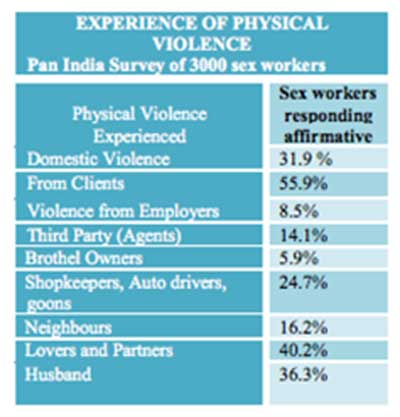Tanya Kumar
Last month, while researching on Sex Worker’s rights movements in India for an academic project, I came across some extremely disturbing incidents mentioned by VAMP (Veshya Anyay Mukti Parishad) and other online articles describing the plight of Sex Worker’s in our country. One of the most glaring incidents mentioned by them was of a sex worker with speech and hearing impairment who was detained at an observation home after a brothel raid, who requested a judge to let her go home and the judge snarkily responded in open court saying “a woman who has come from the gutter, wants to return to the gutter?”.
In a system which is so biased against sex workers where they are refused basic access to healthcare and police protection, if the judiciary also treats them in a demeaning manner, where are we headed?The role of the judiciary in India is to protect the constitutional rights of citizens and enforce the rule of law. Does a community suffering from the burden of stigmatization not deserve the fundamental rights of equality before law and right to protection of civil rights? The treatment of this community is testament to the fact that our dream of achieving an egalitarian and liberal society is at a distant horizon.
State of the Women in Sex Work
According to the National AIDS Control Organization, there are 800,000 women in sex work in India officially and the unofficial numbers are definitely much higher. This large section of society faces widespread stigmatization and social exclusion in the following ways:
- Violence – The marginalization of sex workers due to the perception of them being social miscreants and their actions being unlawful has led to this community being extremely vulnerable to violent crimes. Due to the nature of their job, they are not even protected under the Protection of Women from Domestic Violence Act, 2005. The following stats from a survey of 3000 sex workers conducted by CASAM, SANGRAM, MASUM and VAMP organisations of India, clearly show the extent of the problem
- Police Mistreatment – The police in most cases due to their personal biases mistreat sex workers and wrongfully arrest and detain them after brothel raids or for public nuisance or obscene conduct which are provisions in the Indian Penal Code. This is followed by instances of police violence as we can see in the same survey of these 3000 women
- Denial of Labour Protection Rights – Even though sex work is not illegal, it is not recognized as a profession under the Indian Law. This leads to them being deprived of basic rights such as minimum wages, unionization rights, health and safety regulations, legal redressal systems and protection from exploitation.
- Denial of Healthcare Access – The health problem of STDs and HIV/AIDS is widespread in this community. Hence, they not only deserve but also require free/affordable healthcare to prevent and treat these diseases. However, most women have reported hostility from public hospitals and the stigma towards these diseases is further blocking the required penetration required to reach these women. National AIDS Control Organization and its partners have been attempting to reach out to this community however, it requires much more support and de-stigmatization to be successful.
- Denial of Access to Justice – The police, justice system, labour protection, women rights committees have all been failing the sex worker’s community and instead of providing them a safe space to complain about violence, exploitation, and other rights infringements, the system itself harasses these women through wrongful detention and mistreatment
 Working towards the Problem
Working towards the Problem
There are organizations such as VAMP, Durbar Mahila Samanwaya Committee (DMSC),SANGRAM (Sampada Grameen Mahila Sanstha) etc., who have been working towards protecting the rights of these women and bringing the community together to create a united voice and a collective which can demand their right to healthcare, purchasing houses, alternate employment opportunities and fair and just treatment by the police.
Most of these movements have been aimed at separating the association of human trafficking and sex work. Human trafficking and forcing women into sex work through trafficking is a criminal offence. However, this is a separate issue and needs to be dealt with at a policing level. Sex work in itself is not a criminal offence, however, due to this association and societal stigmatization it is treated as one. Most of these women are victims of societal mistreatment rather than trafficking. They are ones who have moved into the profession voluntarily and to earn a livelihood. Hence, they do not want to be treated as victims and just want equal rights as the rest of society. The treatment of the sex worker by the judge as mentioned at the beginning of the article portrays how their profession is looked down upon to an extent where they are not treated as human beings at all. This results in unnecessary police detention, misguided rehabilitation and mistreatment of sex workers after brothel raids.
The only way forward is for the system to start recognizing them as citizens of India with rights. If the government can ensure they have identification documents, ration cards and other social entitlements through registrations, they can be protected in the same sphere as labourers are. Steps should be taken to ensure their participation in policy making in order to amend backward laws that affect sex workers and move towards decriminalizing related activities to sex work which result in the harassment of sex workers. Violence against sex workers should be dealt with severely and mechanisms need to be in place to ensure their access to the justice system. And lastly, there needs to be a collective which can stand together and hold the government accountable if this community is deprived of any of the above rights.
No comments:
Post a Comment